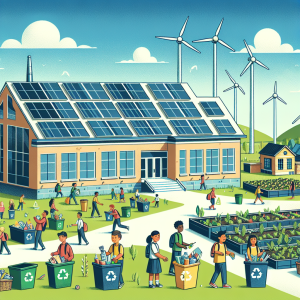How Businesses Can Benefit from Recycling Programs
Recycling programs offer a multitude of benefits for businesses across various industries, improving operational efficiency, enhancing brand reputation, and contributing to a sustainable future. Companies adopting these programs can significantly decrease their environmental impact while realizing financial gains. Here, we explore how businesses can capitalize on recycling initiatives to enhance their operations and bottom line.
The financial advantages of recycling programs can be substantial. By reducing the amount of waste sent to landfills, businesses can save on disposal costs which, over time, significantly impacts the budget. Many recycling initiatives involve partnerships with local waste management companies, which often provide cost-effective solutions tailored to business needs. Additionally, businesses can recover materials like paper, cardboard, and metals and sell them to recycling firms. This not only generates revenue but also offsets raw material purchasing costs.
Businesses stand to gain from government incentives and grants when implementing recycling programs. Many regions offer tax credits or financial assistance to companies that demonstrate a commitment to sustainable practices. These incentives can offset initial investment costs for recycling infrastructure and education, making recycling more economically viable. Staying informed about applicable government programs is crucial for maximizing these benefits.
Recycling programs also have a positive impact on brand image and customer perception. In today’s eco-conscious market, consumers prefer brands that demonstrate a commitment to sustainability. By actively participating in recycling initiatives, businesses cultivate a positive public image, leading to enhanced customer loyalty and potentially increasing market share. Transparently communicating the impact of recycling programs through marketing and social media outreach further strengthens consumer relationships.
Implementing a recycling program also fosters employee engagement and morale. Employees are more likely to feel a sense of pride working for a company that values sustainability. Businesses can reinforce this by involving staff in recycling efforts, establishing green committees, or offering incentives for innovative waste reduction ideas. Engaged employees often perform better, leading to increased productivity and job satisfaction.
Another significant advantage of recycling is resource conservation. Many materials, such as aluminum and paper, can be recycled multiple times, reducing the need for virgin resources. This diminishes the demand for resource extraction activities, which are often energy-intensive and environmentally damaging. By lessening reliance on new materials, businesses contribute to a reduced carbon footprint and play a role in conserving natural habitats and biodiversity.
Recycling programs encourage innovation and efficiency. When businesses assess their waste streams, they often uncover inefficiencies in production or packaging that contribute to excessive waste. Identifying these areas provides opportunities to optimize processes, develop new products, or adopt sustainable packaging solutions. Such innovations can lead to cost savings and open up new markets that prioritize eco-friendly products.
In addition to these internal benefits, recycling programs enhance community relations by positioning businesses as leaders in environmental stewardship. Collaborating with local organizations on recycling drives or educational programs strengthens community ties and raises awareness of sustainability initiatives. These partnerships can lead to mutually beneficial outcomes, such as increased local support and networking opportunities in sustainability circles.
Supply chain benefits are another area where businesses can see gains from recycling efforts. By developing a closed-loop system where waste materials are reintegrated into production, businesses can create a more resilient and flexible supply chain. This circular approach reduces dependency on external suppliers for raw materials and shields the business from market volatility regarding material costs. Furthermore, promoting sustainability throughout the supply chain demonstrates a comprehensive commitment to environmental responsibility, which can be crucial in securing partnerships with other socially responsible companies.
Businesses also gain a competitive edge through compliance and risk mitigation by adopting recycling programs. Environmental regulations are increasingly stringent, and recycling helps companies meet legislative requirements, avoiding potential fines and sanctions. Proactively maintaining compliance positions businesses favorably in negotiations and tenders, as many discerning clients and partners prioritize sustainable operational practices.
The digital transformation of recycling through data-driven analytics introduces new opportunities for business insight and decision-making. Advanced tracking technologies enable precise measurement of waste streams and recycling rates, providing valuable data for continuous improvement. Leveraging this data aids in setting realistic sustainability targets, optimizing waste management practices, and demonstrating accountability to stakeholders.
For small and medium enterprises (SMEs), recycling programs level the playing field with larger competitors by providing unique selling propositions rooted in sustainability. While often viewed as a challenge, limited resources can inspire creative waste management strategies that resonate with eco-conscious consumers. SMEs that communicate their commitment to sustainable practices can carve out niche markets and build a loyal customer base.
In conclusion, businesses that strategically implement recycling programs can reap a tremendous variety of benefits. From financial savings and improved brand image to operational efficiencies and environmental stewardship, recycling offers substantial value to any organization. By viewing waste as a resource, companies not only enhance their sustainability profile but also ensure long-term, sustainable growth in an increasingly eco-conscious marketplace.




